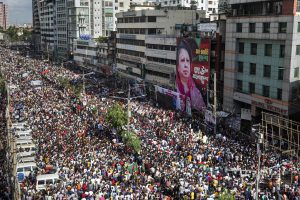On August 5, the world may have witnessed a pivotal moment in history, as Generation Z (born between 1997-2012) led what could be considered the first successful revolution of its kind. This demographic, often criticized by older generations for their preoccupation with digital technology and virtual worlds, has proven such stereotypes wrong in Bangladesh. Commonplace discussions that once relegated these young individuals to mere gadgets and fantasies have been upended by their actions.
The event should have garnered global celebration and praise, as these young individuals boldly stood up to an autocratic regime that had been in power for 15 years. This regime was notorious for its human rights violations, including extrajudicial killings, abductions, false cases, and rampant corruption. It was led by the former prime minister and president of the Awami League (AL), Sheikh Hasina, who has since fled and is reportedly seeking political asylum in India.
What began as a peaceful protest demanding reforms to the government job quota system quickly escalated into calls for Hasina’s resignation after more than 300 individuals, including students and children, were killed by law enforcement. The use of lethal force, including shootings from helicopters in various parts of the capital, intensified public animosity toward the AL and Hasina.
However, the revolution’s aftermath was not a time for celebration for the students and the general populace. Instead, they experienced a tense night on August 5, marked by arson, attacks on the homes of AL leaders, further killings, and looting in several locations, including Ganabhban and the national parliament house. The police force remained inactive during these events. Islamist party activists compounded the chaos by vandalizing murals of Bangabandhu Sheikh Mujibur Rahman, the nation’s founding father, and other historical figures.
Disturbing footage of brutal killings of AL leaders and police officers by an enraged mob, as well as attacks by opposition parties, particularly the Bangladesh National Party (BNP) and Jamaat-e-Islami, spread across social media platforms. These groups also targeted Hindu temples nationwide, causing distress among non-Bangladeshis and prompting the Anti-Discrimination Student Movement organizers to call for an end to the violence and vandalism.
On the night of their tumultuous victory, students were compelled to return to the streets to protect the religious establishments of minority communities. In Bangladesh, where over 90 percent of the population practices Islam, this was a significant act of solidarity.
The following day, student leaders announced via social media that Nobel Laureate Dr. Muhammad Yunus had accepted their proposal to lead an interim government. This news brought a sense of relief to the people of Bangladesh, particularly the students. Political experts and leaders concurred that Yunus was the most suitable choice for this role. Military chief General Waker-uz-Zaman, who is responsible for governance until the interim government is set up, stated that Yunus is expected to arrive on August 8 and will take the oath of office at 8:00 pm the following day.
On August 7, amid concerns for public safety, the BNP called for an assembly at the capital’s Naya Paltan. Begum Khaleda Zia, who was just released from house arrest stemming from a corruption conviction, and her son Tarique Rahman, who remains in exile, addressed the gathering via video call. The BNP has demanded a national election under an interim government within three months.
These actions by the BNP have ignited a fire within the student community, as evidenced by the millions of posts under the hashtags #nobnp and #nojamat on social media. Many are questioning the BNP’s decision to hold an assembly in the absence of law enforcement and are calling for a new system that is no longer dominated by either of Bangladesh’s two main parties: the AL and the BNP.
Almas Tahmid, a student of the Department of English and Humanities at the University of Liberal Arts Bangladesh, said to The Diplomat. “There is no difference between the AL, BNP, and JI. They all harbor autocratic tendencies, and the political parties are hijacking the revolution that the students have fought for.”
Tahmid further commented on the students’ efforts to restore normalcy: “While we, the general students, are cleaning the cities, safeguarding our minority neighbors, and managing traffic, they [the BNP] are preoccupied with elections. Our priority is to rebuild the country under the interim government before participating in any election.”
The BNP, which has won multiple national elections and last held power from 2001 to 2006, has faced criticism for its autocratic practices, including political repression and intolerance for dissent. The party’s governance was characterized by political turmoil, allegations of human rights abuses, and manipulation of the judiciary.
BNP supporters are advocating for Tarique Rahman to become the next prime minister. His rise to political prominence began in the early 2000s during the BNP’s tenure in government. However, his career has been overshadowed by controversy, including his alleged involvement in the 2004 ten-truck arms haul case, which involved a significant cache of arms and ammunition intended for the Indian separatist group ULFA. This case underscored the challenges of corruption and accountability within the political system.
In 2018, Rahman was sentenced to life imprisonment for his involvement in the 2004 Dhaka grenade attack, which targeted then-opposition leader Sheikh Hasina. Despite these controversies, he has continued to exert influence over BNP politics from his exile in London, where he has resided since 2008 following the party’s electoral defeat and the rise of the Awami League.
The BNP’s history, along with Rahman’s legal challenges, illustrates the complex and often turbulent nature of Bangladeshi politics. The party’s past governance has been scrutinized for autocratic tendencies, and Tarique’s involvement in high-profile legal cases has had a significant impact on the nation’s pursuit of democratic governance and the rule of law.

































